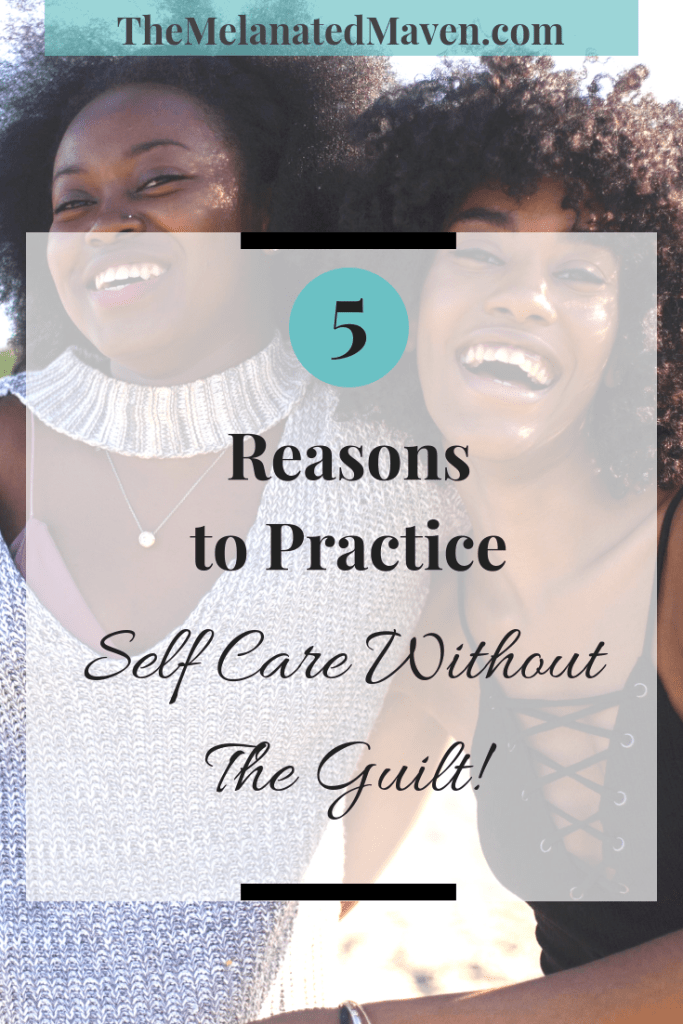
When I think of practicing my own self care, I get excited just thinking about making time for all my favorite things. Whether it’s deciding my next protective style or just getting some sunshine, these are some of my go-tos when I’m feeling extra stressed and restless.
So I make sure to work even harder to make them a priority. But even though I’ve got my self care on-lock, it can sometimes be hard to practice self care without the guilt.
Sound familiar?
Ever felt that nagging feeling like you’re neglecting your loved ones and responsibilities by spending “too much time” on yourself? Or that the world will come crashing down if you don’t commit to every little thing?
The thoughts can be endless! And once you let these distracting thoughts take over, it can be hard to fully enjoy the R&R you had planned.
But what if I told you that whole-heartedly investing in your self care, would also benefit the very people you’re afraid of letting down? And even allow you to have more patience and grace with the ones you love?
Believe it or not, it’s all about perspective.
Why Self-Care Isn’t Selfish, It’s Necessary
Investing In Yourself
Ever try to help someone with a problem when you’re short on patience? This is what living life without a self care time-out can feel like! When you make time to unwind and do the things that bring you joy, it helps you to creative a more happy and positive mental space.
And when you’re a happier person, living life just feels better. And allows you to be more fully present when you’re with the people you care about.
Making yourself a priority on a regular basis is a way of holding yourself accountable. To learn to schedule your self care and keep more promises to yourself, even when you’re at your busiest. And I’ve learned that self care without the guilt has to first start with creating a habit of investing in myself.
Related: 5 Types of Self Care Essential Guide
Your Needs Are important Too
The more you put other’s needs over your own, you’re essentially telling yourself that your needs are not as important. Every time you justify letting a friend continue to pick a restaurant you hate but she loves, or continue to take on too much at work, you’re not speaking up for what you want.
Because each time you speak up, no matter how small, it’s an opportunity to honor your authenticity and be truly honest with yourself.
Being more vocal about your needs is also a sure-fire way to help create deeper, and more honest connections in your current relationships. Because being true to yourself helps you make more solid decisions about who you surround yourself with, and what you’re willing to tolerate.
It makes you better at making choices that benefit your well-being first, not others.
Related: Are You In A Toxic Friendship?
Awareness
Ever get so caught up in doing, doing, doing that you can’t even remember the last time you ate? Or even took a full breath? Being more aware of these moments, and intentionally taking a much-needed break allows you to stop doing and thinking, and just be.
When I get caught in a cycle of negative thoughts, I turn to journaling. Writing them down helps me realize what my triggers are and what kind of self care practice can change my perspective to a more positive one.
And for me, talking out my emotions with my fiancé and focusing on affirmations to remind me that I’m doing enough, help me overcome feeling overwhelmed and stuck.
It works every time.
Carving out your own sacred mental space when you need it most and asking yourself what you need in that very moment, can make the difference between having a healthy, productive day, and an exhausting one.
When you pay more attention to your needs, you grow to learn more about what you need to be happy and the best version of yourself you can be. And that’s personal growth at it’s finest!
Prevent Burn-Out
Practicing self care without the guilt can also prevent you from feeling physically drained. It’s no secret that unaddressed stress and anxiety can manifest into more serious medical issues like high blood pressure and greater susceptibility to sickness. And it is no different when it comes to preventing burnout from the stress that life can bring you!
When you’re feeling mentally and emotionally exhausted, even the smallest of tasks can seem like an insurmountable mountain.
And this is the perfect opportunity for stress to cue a cycle of negative thinking, when you’re emotional energy is already too tapped out to fight it.
So when you recharge, now you’re become more aware of the limitations and boundaries your energy can withstand. You’re less likely to commit to too much and feel guilty about turning things down because you’ve taken the pressure of unrealistic expectations off of yourself.
Related: How Being Patient With Yourself Reduces Stress
Focus on the Present
From birth, we’ve been socially conditioned to continuously strive for the next milestone. Whether it’s our first steps as a baby, or preparing for college, achieving has had us focused on who we want to become next, instead of being.
And what happens after you hit that milestone? Chances are you’re already got your mind set on your next goal, with no time for rest in-between. This is a prime example of what can happen when you don’t allow yourself to practice self care without the guilt. You’re forever running the rat race!
Life isn’t always about completing a checklist. Living in the present lets you focus on living in the moment. This way, you can gain more patience and appreciation for the time, effort, and will you poured into achieving your goals.
Tip: Make a habit of treating yourself after finishing a large task or goal. You deserve it!
So relax and take a breather! Stop beating yourself up about the guilt you’re feeling, and start working through it. At first, feeling guilty can be a normal response to taking more time for yourself. But if it starts to take away from your ability to focus on you, it’s time to re-evaluate.







